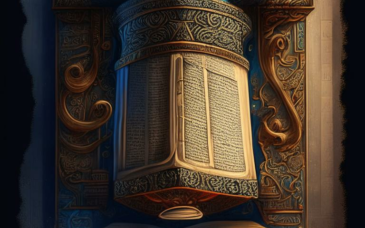Chapter One
This chapter explains that God, Lord of the universe and Master of the world, existed before anything else did, that He has no body, and that there is none other beside Him.
1) It is the most basic of basic principles and a support for wisdom to know that there is something [namely God] that existed before anything else did and that He created everything that there is. Everything in the skies, on the ground and in between exists only because of the fact that He created them.
2) Let it be known that if the Creator did not exist then nothing else would, for nothing can exist independently of the Creator.
3) Let it further be known that if everything ceased to exist, the Creator alone would exist and would not have ceased to exist like everything else had. All things in creation are dependant upon the Creator for their continued existence, but He does not need any of them [for His continued existence]. Therefore, the reality of His existence is not like the reality of the existence of any creation.
4) One of the Prophets said, "But the Lord is the true God", meaning that only God is everlasting and that nothing else is. This is what the Torah has said: "There is none else beside Him", namely, that there is nothing in existence that is everlasting, except for God.
5) The Creator is the God of the world and Master of the Earth, and He guides the [uppermost] sphere with a power that is never-ending, never-weakening and continuous. This sphere rotates perpetually, and it is impossible for it to rotate without being guided. It is God who guides it, even though that He has no hand or body.
6) It is a positive commandment to know these matters, for it is written, "I am the Lord your God". Anyone who even speculates that there might be a god other than the Lord is transgressing a negative commandment, for it is written, "You shall have no other gods besides Me". Anyone who denies this principle is [in effect] denying everything, for it is on this important principle that everything depends.
7) God is not two or more entities, but a single entity of a oneness even more single and unique than any single thing in creation. His oneness is not like that of a single type which consists of many individuals [like the oneness of a species], and nor is it like the oneness of the body, which incorporates many parts, but His oneness is absolutely unique, and there is nothing else in existence with a oneness like His. Had God been more than a single entity, then all of them would have physical bodies, for entities equal in existence differ only in bodily matters. If the Creator did have a body He would have had weaknesses and an end, for it is impossible for a physical body that has no end to exist. The strength of something that has weaknesses and an end also has an end, and a limit. The strength of our God is not like the strength of the body, for it has no end or pause, and perpetually guides the sphere. Since He has no body He has no bodily appearance, and cannot be sub-divided into different parts - therefore, it is impossible for Him to be anything other than one. It is a positive commandment to know this, for it is written, "...the Lord is our God, the Lord is one".
8) It has been stated in Scripture that God has no physical form, as it is written, "...that the Lord is God in heaven above and on the earth beneath: there is none other". A physical body cannot be in two places at once. It is also written, "...for you saw no manner of form", and, "To whom then will you compare Me, that I should be his equal?" - had God had a body it would have been similar to other bodies.
9) If so, what does the Torah mean when it says things like, "under His feet" (Exodus 31:18), "written with the finger of God" (ibid), "the hand of the Lord" (Exodus 9:3), "the eyes of the Lord" (Genesis 38:7), "the ears of the Lord" (Numbers 11:1), et cetera? These phrases are in line with the level of understanding of people, who can only comprehend physical existence, and the Torah speaks in terms that we can understand. All examples of this nature are merely attributory. For example, when it says, "If I whet My glittering sword" - does God really have a sword and does He really kill with one?! Such phrases are figurative. Evidence for this is that one Prophet saw God as wearing garments as white as snow, whereas another Prophet saw God as wearing crimsoned garments from Bozrah. Moses our Teacher himself saw, at the time of the splitting of the Red Sea, God as a war-waging warrior, but at Sinai as a cantor to show him the order of prayer. This shows that God has no form or shape [because He appears different to different people]. God's appearance varies according to each prophetic vision and what it contains. It is beyond Man's intellect to investigate or comprehend [the nature of] God's existence, as it is written, "Can you find out the deep things of God? Can you find out the purpose of the Almighty?".
10) What motive did Moses have to comprehend [God] as it is written, "I beg of You, show me Your glory"? Just as one can recognise a particular person's appearance and know him to be different from other people, so Moses wanted to recognise God's existence and to be able to differentiate from everything else. God replied to Moses that is beyond the strengths of a living man, whose body and soul are as one, to understand the nature of His existence. God then made to Moses things which no man before or since had known so that Moses comprehended - that God is different in intellect from other things in existence, just as a particular person is different in dress and intellect from all other people. Scripture hinted at this matter by saying, "...and you shall see My back, but My face shall not be seen".
11) Once it is known that God has no physical body it will become clear that He doesn't experience any bodily sensations either, sensations such as formation, decomposition, occupying a physical space or size, rising or falling [in standard], a left or right side, a need to stand or sit, et cetera. God does not exist in Time, so He has no beginning or end. God also does not change, for there is nothing that can induce a change in Him. God cannot die, and does not live as life is known. God also has no stupidity or wisdom as we know them, does not sleep or wake up, and does not experience anger, merriment, joy, sadness, silence or speech as we know them. The Sages said, `God does not have a need to sit, a rival, a back or weariness".
12) Since matters concerning bodily experience are such, then all words connected to this mentioned in the Torah and by the Prophets are all exemplary and figures of speech. Examples of this are: "He who sits in the heavens laughs", "...that they provoked Me to anger", "...that as the Lord rejoiced", et cetera. The Sages said that the Torah is phrased in out terms. In Jeremiah 7:9 it says, "Do they provoke Me to anger?", whereas in Malachi 3:6 it says, "For I am the Lord, I do not change". If God [really] was sometimes angry and sometimes joyful, then He would be changing. Such characteristics are found only in the dark and gloomy [existence of having a] body, which lives in huts of mud and which was created from dust, but God is higher and raised above all this.

